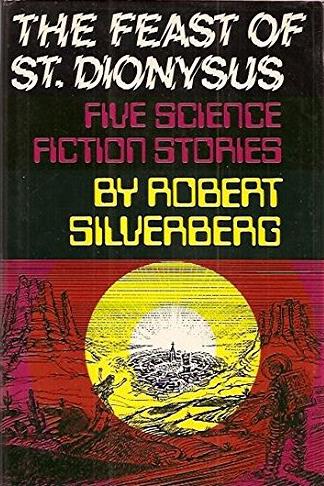Trips
- by Robert Silverberg
- Novelette
- Science Fiction
- Adults
- Time Phenomena
- English
- first full appearance.“Trips” by Robert Silverberg, in The Feast of St. Dionysus (Charles Scribner’s Sons, March 1975).
Silverberg’s introduction to “Trip” in the collection Trips, vol. 4 of the Collected Stories of Robert Silverberg (Subterranean Press, 2009), states that he wrote the story with the goal of being the ultimate alternative universes story, and he lived up to that goal, devising nearly a dozen alternative Bay Area universes for his hero Cameron to express his wanderlust. Admittedly, there’s no actual time travel because the story was part of an anthology of ultimate sf, and Silverberg left the time travelin’ to Philip K. Dick’s “A Little Something for Us Tempunauts.” But there is a world that Cameron thinks is a 1950s San Francisco (it isn’t) and there’s a chance that Cameron experiences the passage of time at rates that differ from world to world.
Warning: The first publication of the story in that ultimate anthology (Final Stage: The Ultimate Science Fiction Anthology) was “cut to shreds” by a ham-handed editor at Charterhouse, so your best bet is to read it in one of Silverberg’s later collections.
Warning: The first publication of the story in that ultimate anthology (Final Stage: The Ultimate Science Fiction Anthology) was “cut to shreds” by a ham-handed editor at Charterhouse, so your best bet is to read it in one of Silverberg’s later collections.
—Michael Main
There’s an infinity of worlds, Elizabeth, side by side, worlds in which all possible variations of every possible event take place. Worlds in which you and I are happily married, in which you and I have been married and divorced, in which you and I don’t exist, in which you exist and I don’t, in which we meet and loathe one another, in which—in which—do you see, Elizabeth, there's a world for everything, and I’ve been traveling from world to world.

Tags
(4)
- Time Periods
- Circa AD 1970 to 1999: Cameron’s departure date was in 1975.
- Themes
- Alternate Histories: These are alternative histories rather than mere parallel universes because they are described as branching based on individual’s decisions. Cameron meets different versions of himself, but does not meet himself in the sence of our time traveler’s tag.
- Differing Time Rates: When Cameron meets almost-his-Elizabeth, he believes that she has experiences only a couple days while he has been gone “weeks and weeks.”
- Groupings
Variants
(2)
- first full appearance.“Trips” by Robert Silverberg, in The Feast of St. Dionysus (Charles Scribner’s Sons, March 1975).
- severely cut by a Charterhouse editor.“Trips” by Robert Silverberg, in Final Stage: The Ultimate Science Fiction Anthology, edited by Edward L. Ferman and Barry N. Malzberg (Charterhouse, May 1974).
Translations
(4)
- Dutch.
“Trips” by Robert Silverberg, in . . . en andere sf-verhalen, edited by Mark Carpentier Alting (Meulenhoff, 1977). - French.
“Trips” by Robert Silverberg, in Trips (J’ai Lu, May 1980). - German.
“Weltenwanderer” [World wanderer] by Robert Silverberg, in Brennpunkt Zukunft 1, edited by Edward L. Ferman and Barry N. Malzberg (Ullstein, November 1982). - Italian.
“Viaggi” [Travel] by Robert Silverberg, in Ultima tappa, edited by Edward L. Ferman and Barry N. Malzberg (Mondadori, November 1977).
